Student Senate’s Executive Board has been 87% international over the past three years. Students suggested that this is the case because of social relations, cultural aspects, personal goals, and a lack of outreach and representation.
The Student Senate Executive Board for the academic year 2024-2025 will be composed of three students from Pakistan, one from Nepal, two from India, one from Japan, one from Indonesia, and one from the United States.

For the academic year of 2023-2024, the Senate’s Executive Board had five students from Pakistan, one from Nepal, two from India, one from South Korea, and two from the United States.
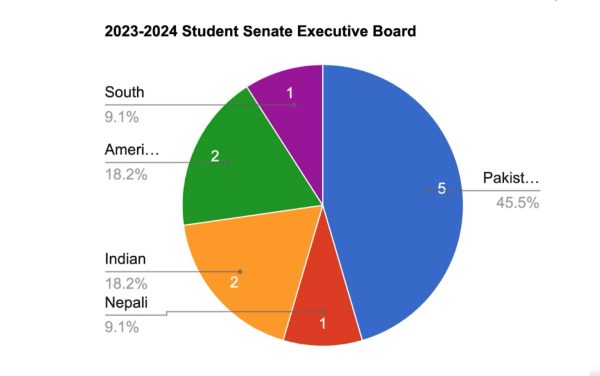
In 2022-2023, the Executive Board had two students from Pakistan, two from Nepal, one from Australia, one from Sri Lanka, one from the Philippines, one from Cuba, one from Singapore, one from India, and one from the United States.
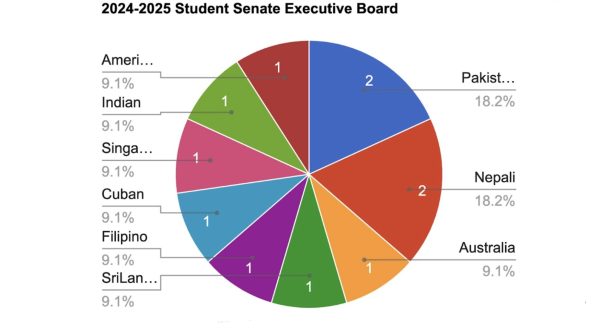
This data shows that the Senate’s executive board has been about 87% international over the past three years. South Asian students, (from Pakistan, India, Nepal, and Sri Lanka) composed approximately 65% of the Senate, while domestic students composed about 13%.
Senior Matthew Sprenger is a white, American student, who is part of the Student Senate. Sprenger said that he joined the Senate in his first year because, as a political science major, he wanted to get into politics. Sprenger has noticed that the population of the student Senate is mostly international with a majority participation of South Asian students, but he has no definite response as to why it is that way.
“It [the predominant participation of South Asian students in Senate] was certainly something I had noticed, this has been consistent throughout all three years I’ve been in the Senate, but I didn’t have specific responses to why that might be,” Sprenger said. “I imagine that there is a good amount of Knox’s population from that region and it extends to the student government.”
Even though Knox College is one of the 50 most diverse campuses in America, having a rate of 19% of international students, the campus is still predominantly domestic and White. However, that population is not reflected in the student senate.
When asked why they were not interested in joining the Student Senate, most interviewed domestic students claimed that they either lacked knowledge of the Senate’s responsibilities or were too busy with other commitments.
“I was busy with other activities, and I just felt like I didn’t have time for it (Student Senate) with academics and soccer,” senior Kasey Snyder said.
“I don’t have time and I am not informed about what it is,” said first-year Asucena Hernandez.
“I don’t feel like I’m helping people if I am in the Senate. I don’t even know what you do in the Senate,” said sophomore Megan Moore.
“I don’t even know what they do,” said Senior Pedro Lopez, “I think if I knew more I’d be inclined to participate.
First-year Ciaran Finn, a white American student, said that the Senate is predominantly influenced by international students of the same friend group. He suggested that, because of that factor, domestic students may feel discouraged from participating.
“Maybe they [the domestic students] think it is a lot ‘dominated’ by South Asian students so they don’t want to try,” said Finn.
First-year Piero Postigo is a white student from Peru. He suggested that the presence of South Asian students in the Senate attracts more people from that ethnicity to apply, thus increasing their chances of being selected. He also perceives the Senate as a group that supports each other based on personal connections.
“There was already a bunch of South Asian students in Senate, and that makes more South Asian students join. I’m guessing that makes more South Asian students apply, so they have more chances to get it,” said Postigo, “I see them as a group of people who are friends and just vote for the people they like.”
“There certainly is a somewhat separation [between International students and domestic students]. I feel if people don’t have friends [in the Senate], then they won’t join,” said Junior Daisy Buchanan.
Buchanan said that having friends in the organization could influence their interest in joining.
“I think that there is a higher possibility I would. I can’t say I would, but I would definitely pay more attention to it and be more involved with it in general,” Buchanan said.
This sentiment is reflected by previous Student Senate member, juior Raj Teli, an international student from India.
“I joined because my friends joined,” Teli said.
Indian international student and class of 2026 senator, sophomore Ridham Dholaria acknowledges the notable presence of South Asian students in the Senate. He believes that is because of a lack of outreach for students of diverse backgrounds. Dholaria said white domestic students may feel discouraged to apply to the Senate because they don’t feel represented.
“Yes, I’ve observed a significant presence of South Asians in the student senate. I believe this is primarily due to the lack of targeted outreach and promotion by the senate or campus life office to encourage students from diverse backgrounds to apply for positions,” said Dholaria. “White domestic students may feel less inclined to apply due to a lack of representation or visibility of their perspectives within the Senate.”
Diversity Chair junior Nysa Phulwar is a student from India. She said that the Student Senate used to be run by students involved in FSL, but in more recent years it has been run mainly by international students. Phulwar implied that this factor created a barrier to domestic students to join the Senate.
“Originally, Student Senate was primarily run by Fraternity and Sorority Life, and people in those organizations typically participate in Student Senate and its activities. In more recent years, that has shifted to more international students taking charge,” said Phulwar. “(…)And because it’s so primarily run by one group of people it’s very difficult for other people to enter the group, you know?”
Phulwar suggested that international students that are in charge of Senate tend to encourage their friends, who tend to be also international or of the same ethnicity, to participate, creating a lack of diversity.
“So that is one of the main reasons why Student Senate sees a lack of diversity. It’s because when one particular group of people are in charge of things, and they encourage, say, their friends to run or people that they know and are close to run because that’s what is convenient,” said Phulwar.
Senate Secretary sophomore Naysha Jain, a student from India, said that international students were the majority who applied for Exec positions for 2024-2025, even though the application email was sent out more than once to all the student distribution list.
“It was mainly the South Asians or international students who applied for it,” said Jain, “The email had been sent many times, and there were still more international students applying.”
First-year Ada Laba Ndiaye considers another possible reason for the international student majority.
“Maybe they [international students] are the only ones who take initiative,” said Laba Ndiaye.
Jain expressed similar thoughts. She highlighted that international students are more motivated to get involved in campus activities. She said that domestic students feel that they are not being represented in Senate but choose not to apply for a position.
“International students are very much wanting to keep involved so they take more initiative and participate more,” said Jain. “Other ethnicities see that they are not representative and they give up. They feel like they are not being represented but they don’t take the initiative and apply.”
Senate first-year Representative Sakshi Ohri, from India, said that because international students are coming from abroad, they want to leave their mark on the school, while domestic students don’t have the same desire.
“International students are coming from abroad, so they want to make a mark, while domestic students don’t find it that valuable,” said Ohri.
Senior Abdullah Pal, from India, said that being part of student organizations gives international students a feeling of, “home,”.
“I think it is because it’s a way to try to be engaged and have a home away from home. Organizations and clubs make international students less homesick, it is a distraction,” said Pal.
Dholaria believes that Senate and the campus life office should promote more inclusivity in their outreach efforts so that all students feel motivated to participate.
“The Senate and campus life office should actively promote inclusivity and diversity in their outreach efforts, ensuring that all students feel encouraged and welcomed to participate. A small step can be encouraging students to attend General assembly meetings and making them familiar with the environment,” said Dholaria.
Phulwar acknowledges the importance of building connections in bringing students to the Senate. She states that in the past three years, the Senate has not been successful in doing so and calls for change.
“Building those connections and relationships is what brings people in,” said Phulwar, “We haven’t been very successful at doing that in recent years, but we are working actively to combat that and bring in more people with diverse ideas and diverse thoughts and opinions.”




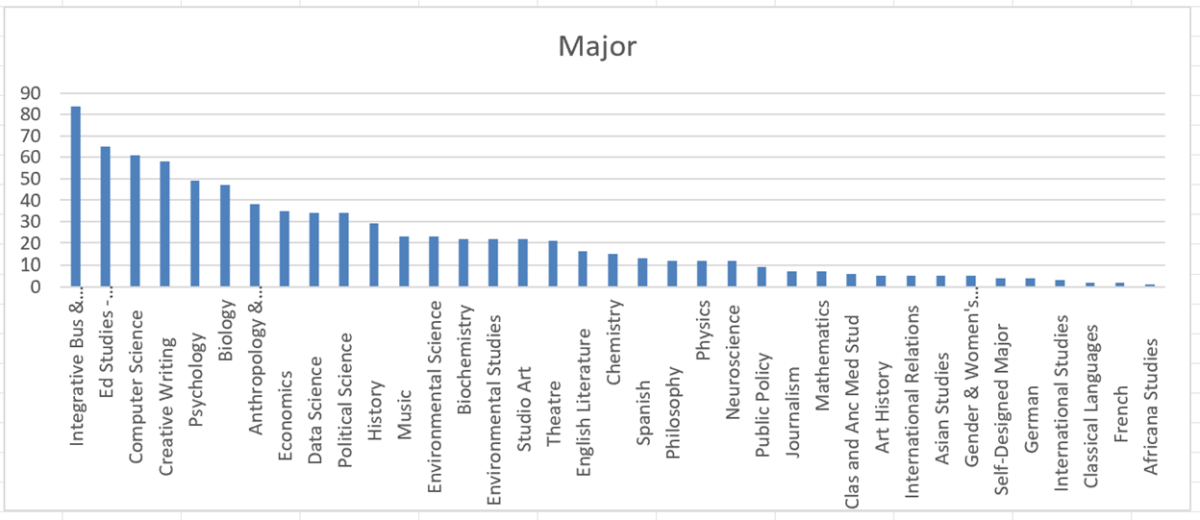

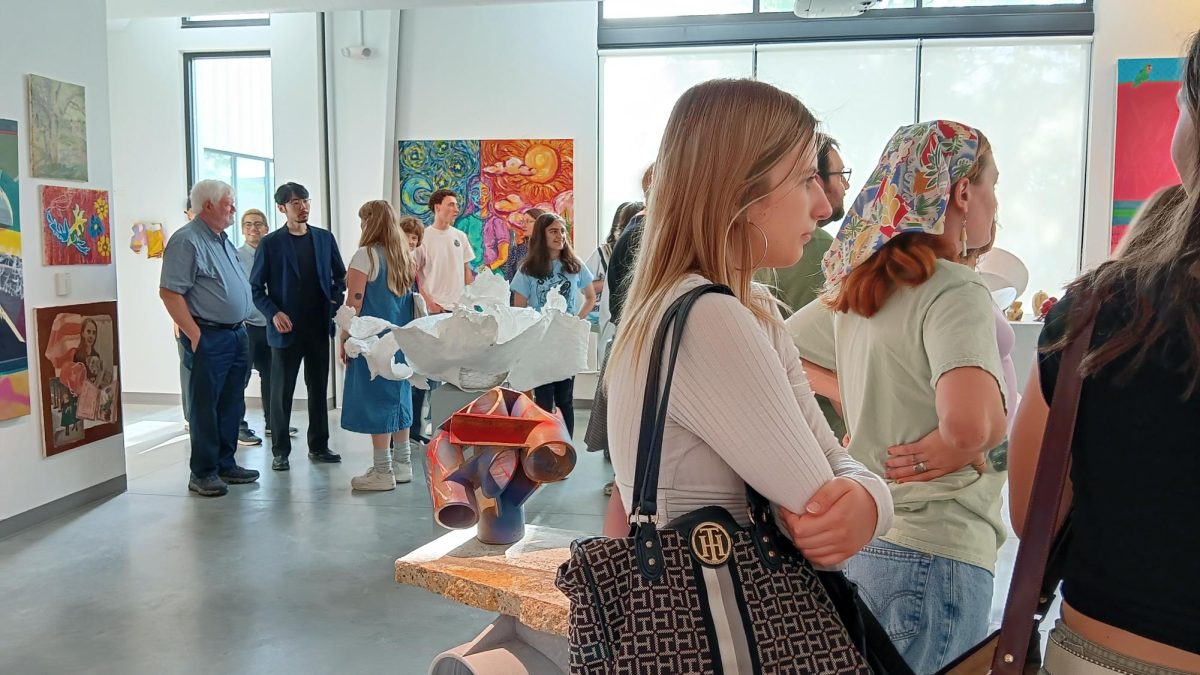

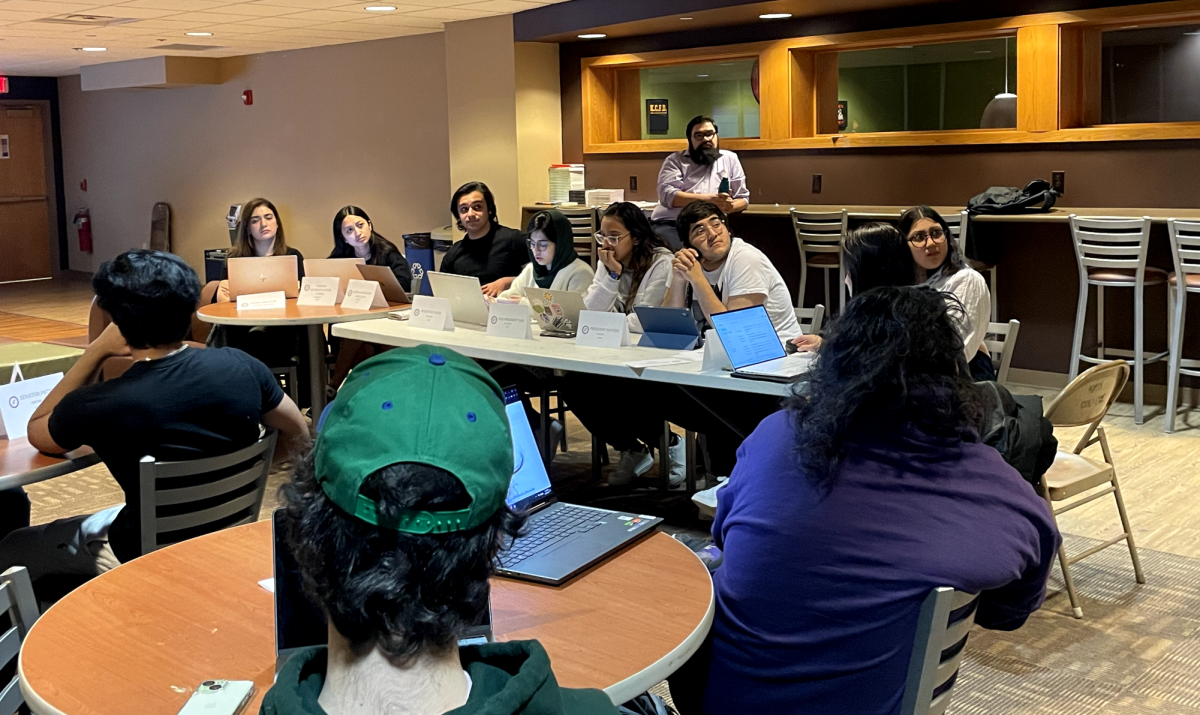

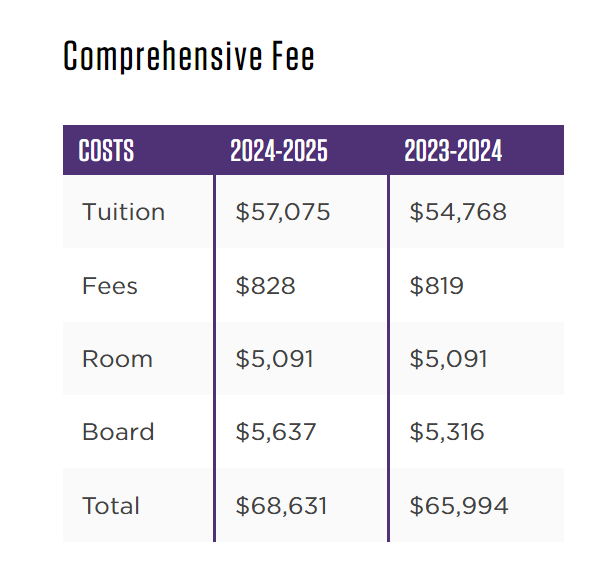



Senator • May 3, 2024 at 4:18 pm
The data for this year is incorrect. There are two Americans on exec for the 24-25 year.